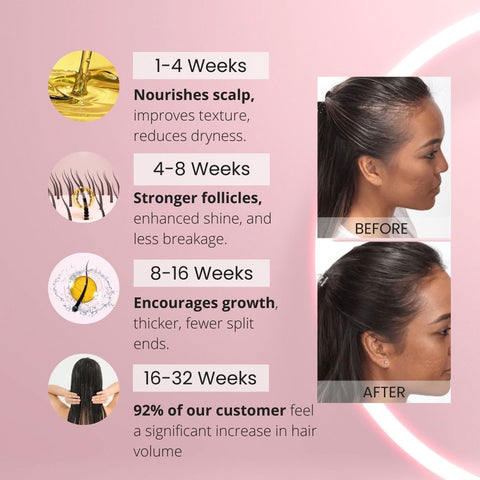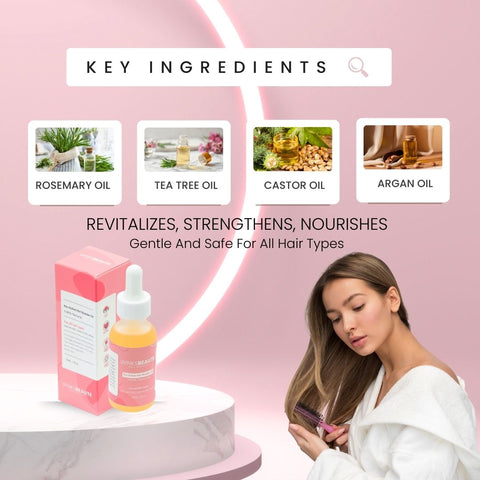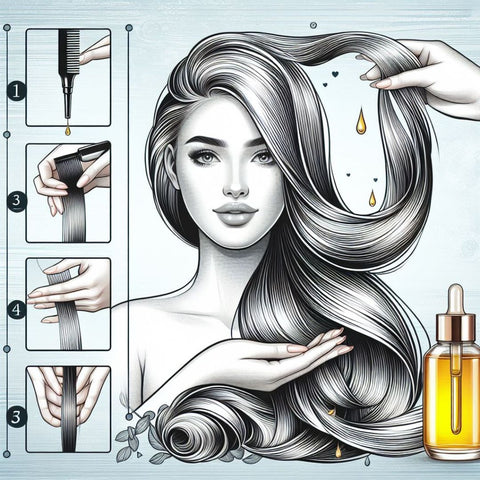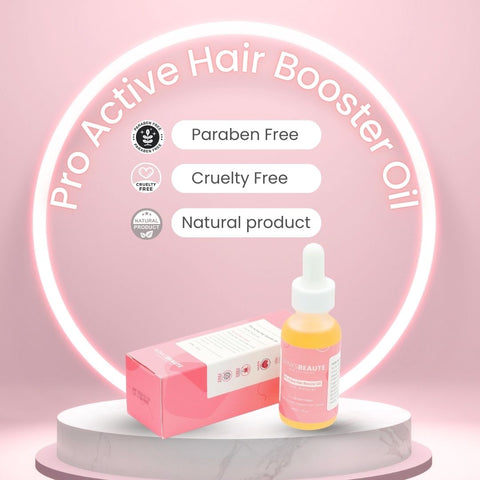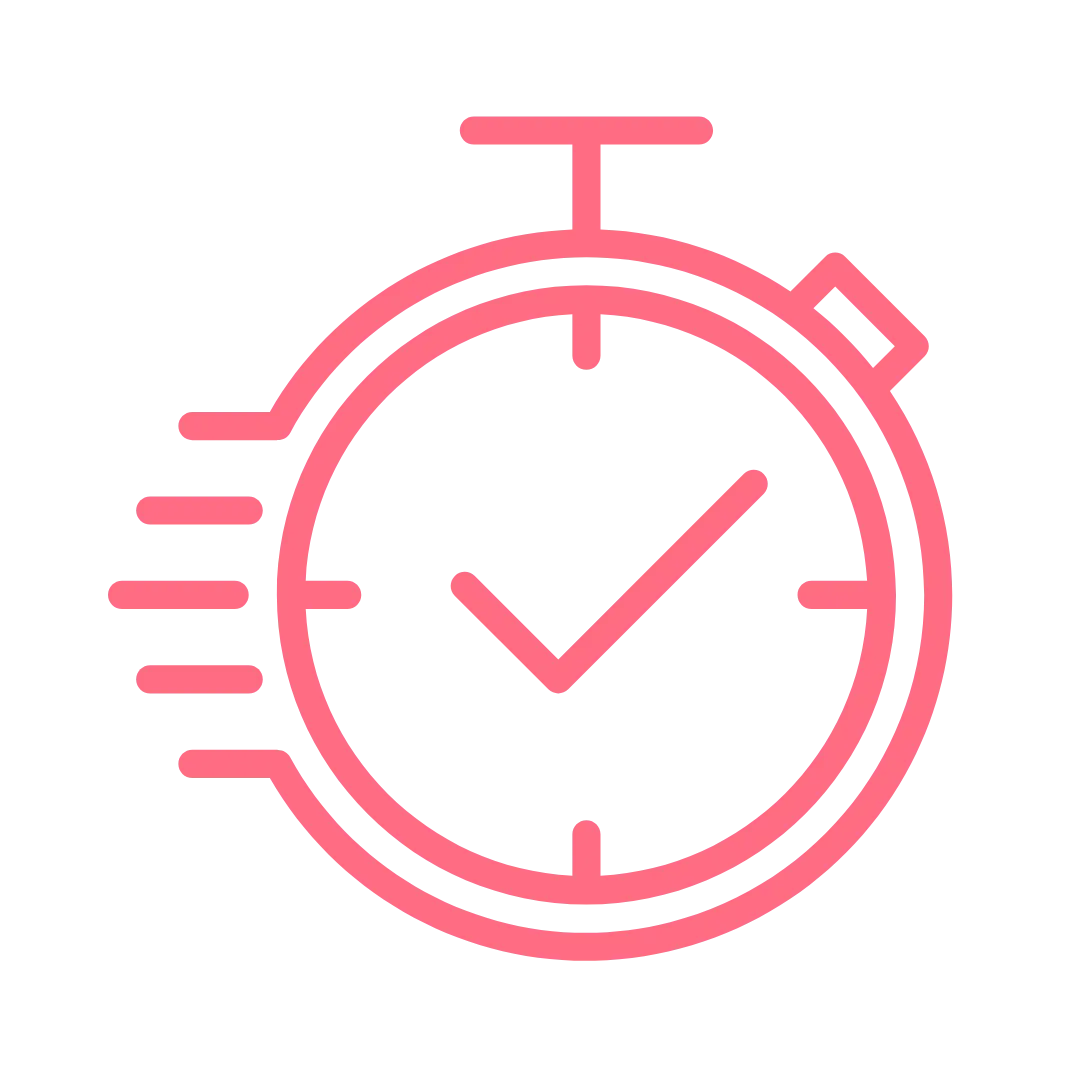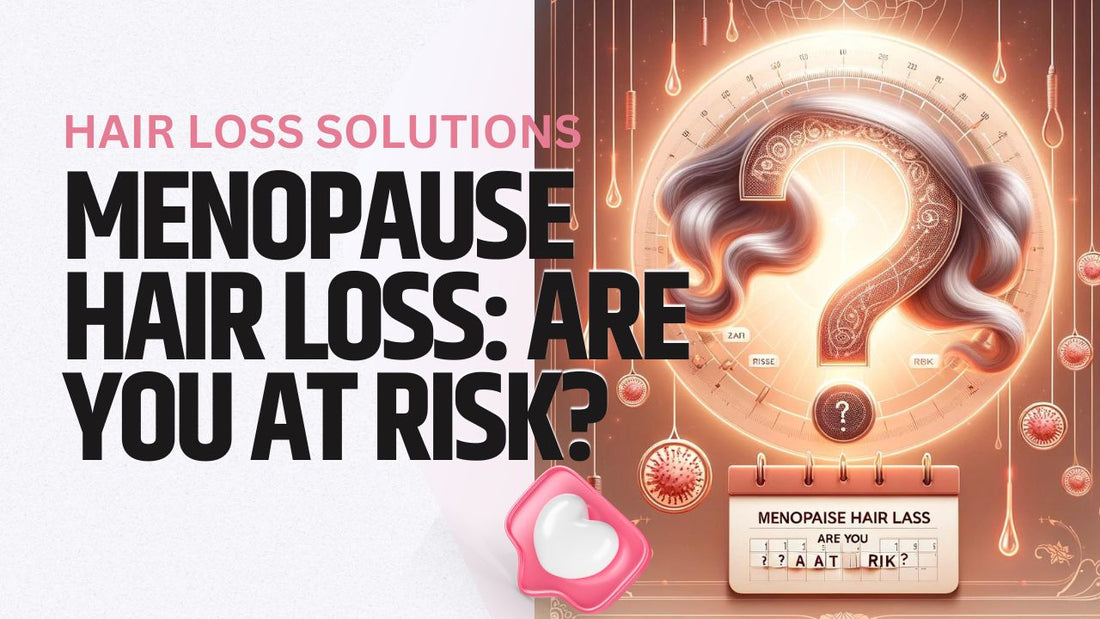
Menopause Hair Loss: Are You At Risk?
Share
Menopause marks a significant milestone in a woman's life, characterized by the cessation of menstrual cycles and significant hormonal shifts. While it's a natural part of aging, the transition can come with a host of symptoms, from hot flashes to mood swings, and notably, changes in hair health. Menopause-related hair loss, a less frequently discussed symptom, can profoundly affect self-esteem and emotional well-being. In this article, we delve into the intricacies of menopause hair loss, its causes, and effective strategies to mitigate its impact, including the promising benefits of natural solutions like the Proactive Rosemary Hair Booster Oil by Winksbeaute.
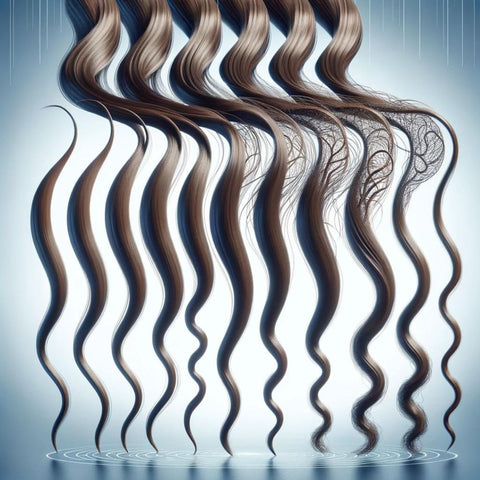
Understanding Menopause and Hair Loss
What is Menopause?
Menopause isn't an overnight event but a gradual process that typically unfolds over several years, marked by three stages: perimenopause, menopause, and postmenopause. This transition is primarily driven by fluctuations in hormones, particularly a decline in estrogen and progesterone, which can have wide-ranging effects on the body, including on hair growth and health.
How Menopause Affects Hair Health
During menopause, the decrease in estrogen and progesterone levels can lead to a relative increase in androgens, male hormones that can shrink hair follicles, resulting in hair thinning and loss. This hormonal imbalance disrupts the natural growth cycle of hair, leading to a noticeable reduction in hair density and volume. Many women find their hair not only thins but also becomes finer, and the scalp may become more visible.
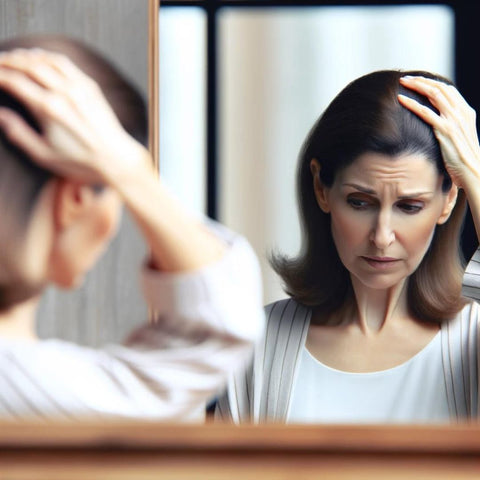
Identifying Menopause Hair Loss
Signs and Symptoms
Recognizing menopause-related hair loss begins with observing changes in hair volume and density, particularly around the crown and hairline. Unlike male pattern baldness, which often starts with a receding hairline or bald spots, menopause hair loss tends to be more diffuse, affecting the entire scalp. Additionally, you might notice more hair shedding than usual during brushing or showering.
Why It Happens: The Science Behind It
The primary culprit behind menopause hair loss is the hormonal upheaval your body undergoes during this period. Estrogen and progesterone support hair growth by extending the growth phase of hair follicles and promoting thicker, more robust hair strands. As these hormone levels drop, and the balance shifts towards androgens, hair follicles can miniaturize, leading to thinner hair and slower growth rates. This hormonal shift not only affects hair growth but also impacts the quality and texture of your hair.

Comparing Menopause Hair Loss with Other Types of Hair Loss
Menopause hair loss, often characterized by a diffuse thinning across the scalp, contrasts significantly with other types of hair loss such as androgenetic alopecia or telogen effluvium. Unlike pattern baldness seen in men, which usually begins with a receding hairline or bald patches, menopause hair loss affects the scalp more uniformly. Understanding this distinction is crucial for choosing the right treatment strategy, as the underlying causes and best approaches to management may differ.
Proactive Measures and Treatments
Adopting proactive measures can significantly impact the health of your hair during menopause. Let's delve into lifestyle changes, professional treatments, and the role of natural solutions in combating this type of hair loss.
Lifestyle Changes for Healthier Hair
The foundation of hair health starts with a balanced diet rich in vitamins and minerals, regular exercise, and effective stress management. Incorporating foods high in vitamins A, C, D, and E, as well as zinc and iron, can provide your hair with the nutrients it needs to stay healthy. Regular physical activity increases blood flow to the scalp, promoting hair growth, while practices like yoga and meditation can help manage stress, a known contributor to hair loss.
Professional Treatments
For those seeking more direct interventions, professional treatments such as hormone replacement therapy (HRT) can address the hormonal imbalances at the heart of menopause hair loss. However, it's important to discuss the potential risks and benefits with your healthcare provider. Other options include topical treatments like minoxidil, which has been shown to stimulate hair growth, and laser therapy, a newer approach that uses light to enhance scalp health and hair thickness.
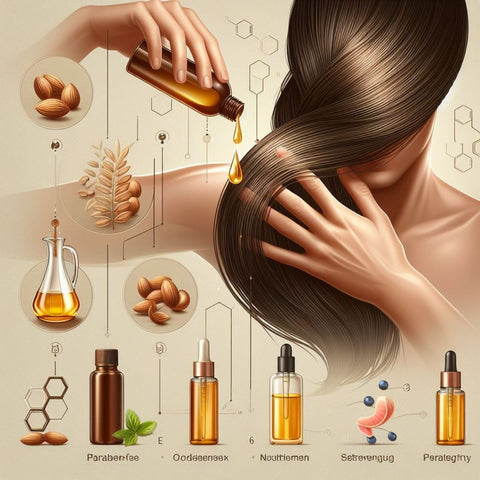
The Role of Natural Solutions in Combating Menopause Hair Loss
In the search for effective treatments, natural solutions have gained popularity for their gentle approach and minimal side effects. Herbs such as saw palmetto and supplements like biotin can support hair health, though it's important to consult with a healthcare professional before starting any new regimen.
Spotlight on Proactive Rosemary Hair Booster Oil
Winksbeaute’s Proactive Rosemary Hair Booster Oil emerges as a standout product in the realm of natural hair care solutions, specifically designed to address the needs of those experiencing menopause-related hair loss. Let's explore why this product is gaining attention and how it can be incorporated into your hair care routine.
Why Choose Proactive Rosemary Hair Booster Oil?
Crafted with a blend of natural oils and extracts, the Proactive Rosemary Hair Booster Oil offers a holistic approach to hair care. Its key ingredients, including rosemary oil, are known for their ability to stimulate the scalp, enhance blood circulation, and support hair growth. This product is not just about addressing hair loss; it's about nurturing the scalp and hair follicles back to health.
Key Ingredients and Their Benefits
The Proactive Rosemary Hair Booster Oil is infused with a potent mix of oils, each selected for their specific benefits to the scalp and hair. Grape seed oil is an excellent antioxidant, castor oil promotes hair growth, and jojoba oil moisturizes the scalp. Additionally, essential oils like lavender and tea tree offer soothing and antimicrobial properties, creating an optimal environment for hair growth.
How to Use Proactive Rosemary Hair Booster Oil Effectively
Incorporating this oil into your hair care routine is straightforward. Apply it directly to the scalp and massage gently to ensure it penetrates deeply. For best results, use it consistently as part of your nightly routine, allowing the natural ingredients to work their magic as you sleep.
Success Stories: Real Results from Real Women
The journey towards healthier hair during menopause is personal and unique for each individual. However, the power of shared experiences cannot be underestimated. Countless women have turned to Proactive Rosemary Hair Booster Oil, experiencing remarkable improvements in hair density, strength, and overall health. These testimonials offer hope and validation for others facing similar challenges, proving that with the right approach, revitalizing your hair is possible.
Navigating Towards Healthier Hair
Empowered with knowledge and the right tools, navigating menopause-related hair loss becomes a journey of self-care and discovery. While the experience of hair thinning can be distressing, it also presents an opportunity to connect with your body in new ways and find solutions that not only improve hair health but also enhance overall well-being.
Embracing Natural Solutions
In the quest for healthier hair, the emphasis on natural solutions like the Proactive Rosemary Hair Booster Oil underscores a broader shift towards holistic health practices. By choosing products with natural ingredients, you're not just addressing hair loss; you're nurturing your body and respecting its natural rhythms.
A Call to Action
For those experiencing menopause-related hair loss, the message is clear: there are effective strategies and products that can help. Whether through lifestyle adjustments, professional treatments, or natural remedies like Proactive Rosemary Hair Booster Oil, the path to healthier hair is within reach. We encourage you to explore these options, armed with the knowledge and insights shared in this article.
Frequently Asked Questions
Can hair loss during menopause be reversed?
While individual results may vary, many women find that with the right treatment approach, including lifestyle changes and natural products like Proactive Rosemary Hair Booster Oil, they can significantly improve hair density and health.
How long does it take to see results from using Proactive Rosemary Hair Booster Oil?
Results can vary, but many users report noticing improvements in hair texture and reduced hair fall within a few weeks of consistent use. For best results, we recommend using the product as part of a regular hair care routine over several months.
Are there any side effects to using natural hair growth products?
Users generally tolerate natural products like Proactive Rosemary Hair Booster Oil well, and they carry a minimal risk of side effects. However, it's always a good idea to perform a patch test before using a new product extensively, especially if you have sensitive skin.
Can lifestyle changes really make a difference in hair health during menopause?
Absolutely. Diet, exercise, and stress management play crucial roles in overall health, including hair health. Nutrient-rich foods, regular physical activity, and stress reduction techniques can all contribute to stronger, healthier hair during menopause and beyond.
A Journey Forward
The challenge of menopause-related hair loss is significant, but it's also an invitation to explore and embrace solutions that offer hope and renewal. With the right support, information, and products like Proactive Rosemary Hair Booster Oil, you can take meaningful steps toward reclaiming your hair's health and confidence. Remember, the journey towards healthier hair is not just about the destination but about embracing the process with kindness and patience towards yourself.


